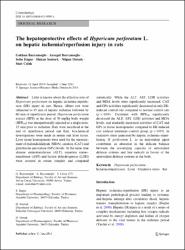The hepatoprotective effects of Hypericum perforatum L. on hepatic ischemia/reperfusion injury in rats

View/
Access
info:eu-repo/semantics/openAccessDate
2014Author
Bayramoğlu, GökhanBayramoğlu, Ayşegül
Engür, Selin
Şentürk, Hakan
Öztürk, Nilgün
Çolak, Suat
Metadata
Show full item recordAbstract
Little is known about the effective role of Hypericum perforatum on hepatic ischemia-reperfusion (I/R) injury in rats. Hence, albino rats were subjected to 45 min of hepatic ischemia followed by 60 min of reperfusion period. Hypericum perforatum extract (HPE) at the dose of 50 mg/kg body weight (HPE50) was intraperitonally injected as a single dose, 15 min prior to ischemia. Rats were sacrificed at the end of reperfusion period and then, biochemical investigations were made in serum and liver tissue. Liver tissue homogenates were used for the measurement of malondialdehyde (MDA), catalase (CAT) and glutathione peroxidase (GPx) levels. At the same time alanine aminotransferase (ALT), aspartate aminotransferase (AST) and lactate dehydrogenase (LDH) were assayed in serum samples and compared statistically. While the ALT, AST, LDH activities and MDA levels were significantly increased, CAT and GPx activities significantly decreased in only I/R-induced control rats compared to normal control rats (p < 0.05). Treatment with HPE50 significantly decreased the ALT, AST, LDH activities and MDA levels, and markedly increased activities of CAT and GPx in tissue homogenates compared to I/R-induced rats without treatment-control group (p < 0.05). In oxidative stress generated by hepatic ischemia-reperfusion, H. perforatum L. as an antioxidant agent contributes an alteration in the delicate balance between the scavenging capacity of antioxidant defence systems and free radicals in favour of the antioxidant defence systems in the body.

















